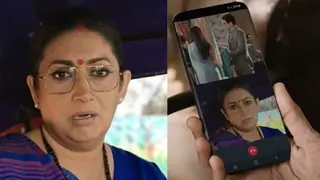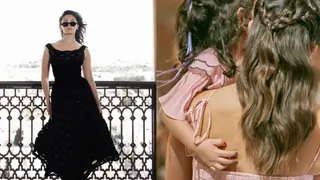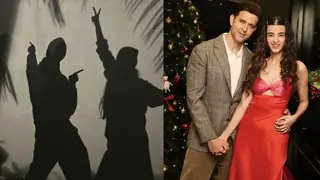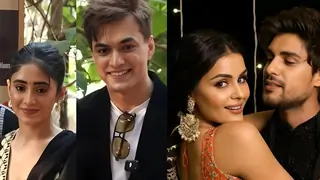Roshan and the adorning of the Hindi Film Song with Shringar Ras
October 27, 2005
There is an apocryphal story about Roshan requesting S. D. Burman's permission to use the tune of Thandi hawaein, lehera ke aayen from Naujawan for a song Roshan was composing for Mamta. It seems Burman agreed and Roshan used it to create that lilting Rahein Na Rahein Hum. Parables like these, almost always have more than one lesson. First: that genuinely creative people are marked by a magnanimity and a respect for creative ownership that others, less endowed, lack. Second: the stamp of an individual's genius can forcefully wipe out every trace of the original material that he starts with. Listen to the ravishingly embellished Lata voice, the little tinkles in the background, the small flute interludes, the perfectly orchestrated flourishes - the little musical Shringars in the Mamta song and you will see Roshan sweetly dress-up Sachin Dev's musical gift with care and respect. Many years later, in the age-old Indian tradition of the son laying claim to his father's legacy, R. D. Burman's reversioned his father's Naujawan song for Sagar: Sagar Kinare is positively flat in comparision to Roshan's.
So rich, complex and beguilingly beautiful was Roshan's arrangement that it remains without parallel till this day. When Rafi sang the ominously vibrant Dil Jo Na Keh Saka in Bheegi Raat, the accordion, the xylophone and the violins all chase him breathlessly, speed up when he slows down, returning to hold him as he nears the end of each verse. When Lata sang for Roshan she let her voice free letting it do what it would, until she had a gamaka in almost every word and then some more until at the end, that poor thing added, almost one per syllable. Listen to Lata sing Ae Ree Jane Na Doongi in Chitralekha (it also had the orchestral classic Kaahe tarsaye) - I counted 11 in the first asthahi itself. The orchestration is divine: First the tabla and the xylophone set it up for a bunch of sitars to consolidate the tune, eventually giving way to a plaintive sarangi that finally invites a shy Lata in. The flute at the beginning and the end frames the mukhda and the tabla flourish at the end of each verse calls for fresh beginning, rousing the orchestra to have one more go at it. Four times. Heaven!
As a child I frequently heard Baar Baar Tohe Kya Samjhaye Payal a Rafi-Lata duet by Roshan for Aarti. It had an arrogantly loud, but never jarring, pesky little solo harmomium interlude right in the middle of each verse. It would come and go as if it owned the song. As a child, I would try hard to predict its timing - so convinced was I, that it came at a different time each time I heard the song. I have always considered O. P. Nayyar to be the master of rhythm and beat, yet Roshan routinely composed songs between two beats, sometimes packing an entire tune in just one or two words. Listen to Mukesh sing Baharon ne mera chaman loot kar, Fiza ko yeh ilzam kyon de diya from Devar. The bass percussions just go Thock-Thock Thock-Thock like a dull metronome in the background and the foreground has a lovely melody, surprisingly lead by Mukesh himself, that flows in and out and in between the beats. For a great singer who would only reluctantly shake his flat voice and only under pressure, just once or twice in an entire song, Mukesh must have been a tired man after the Devar recodings, but surprised nevertheless, at what his voice could do in the hands of a master.
The divinely lilting Paon Choo lene do phoolon ko inayat hogi from Taj Mahal had, at that time, the most innovative structure: The beat is a simple 1-2-3, 1-2-3, metronome that never changes through out the song. The lyrics themselves are just a series of "first-he-said - then - she-said - then - he-said ..." couplets. No verses. Just alternating couplets with that constant beat. But in between the beats flows a melody of such ravishing beauty and an unbearable lightness that it just wafts free where it will and damn that 1-2-3 trying to hold it to a pattern. I swear I detected a faint glimmer of emotion on Pradeep Kumar's stoic face as he sang it for Bina Rai.
Roshan gave two qawwalis that have endured as best of their class. First the Asha Bhosle qawwali from Dil Hi To hi - Nigahen Milane ko jee Chahata hai and the other a two-part multi-singer qawwali: Na To caravan ki talash hai with Asha, Manna Dey, S. D. Baatish and Rafi. I have alays believed, that except for a couple of rare exceptions (Warsi Brothers singing in Garm Hawa and possibly Rehman's qawwali from Fiza) the hindi film qawwali has been a disciplined sanitised version of the dervish songs of their origin, robbing them of much of the disorder and therefore their chaotic beauty. Yet in these two cases, my resolve has always given way to grudging admiration. Not least because Roshan's trademark orchestral flourishes give it just the disorderly impetus that this form of song requires. Both have given me immense joy.
Roshan's three films - Mamta, Bahu Begum and Aarti come from probably the most intensely creative period of his life. There was not one ordinary song in any of three films. None less than memorable. Mamta had four Lata's four solos - Rahen na Rahen hum, Rehte the kabhi jin ke dil mein, Chahe to mera jiya lele sawanriya and Vikal Mora manwa and two duets one with Rafi In Baharon mein akele na firo and another with Hemnt Kumar about which more later. Bahu Begum had a wonderfully arranged duet Hum Intezar Karenge and the Lata classic Duniya Kare Sawaal To hum kya jawaab de apart from others equally stirring. Aarti had two duets - that song with the harmonium flourish - Baar Baar Tohe Kya Samjahaye and Aap ne Yaad dilaya to mujhe yaad aya as well as the Rafi solo Ab kya Misaal doon mein tumhare shabab ki Insaan ban gayee hai kiran mahatab ki. Each of these will be remembered for their carefully crafted detail as much as they will be, for their overall melody. Lata spoke in an interview once, about the ghazal Duniya Kare Sawaal and Roshan:
I simply adore this ghazal. The lyrics by Sahir saab were excellent. The tune by Roshan was as usual, impeccable. Roshan saab and I were friends. When he came to Mumbai in the 1940s, he stayed in a garage with his wife. Their first son, Rakesh was born in that garage. He had a vast knowledge of classical music and so did his wife. In fact Ira Roshan and I once sang a duet for Anilda (Anil Biswas). Two other songs composed by Roshan saab which I like very much are 'Rahen na rahen hum' from Mamata and 'Raat ki mehfil sooni sooni' from Noorjehan."
Aprt from a few honorable exceptions, Roshan's was a happy disposition and fittingly many of his songs sing of a happy life. The few that are sombre are complex enough to be multidimensional - In a film called Nayee Umar ki Nayee Fasal Roshan tuned the serious Swapna Jhare Phool Ke, Meet chube shool ke....Caravan guzar gaya gubaar dekhte rahe. In Soorat aur Seerat, Mukesh sang: Bahut diya dene wale ne tujhko, aanchal mein na samaye to kya kije. The two Mukesh songs from Devar are complex in the emotions they bare. Baharon ne mera.. is first a complaint then a protest and finally a call to arms. The lyrics of Aaya mujhe fir yaad wo zaalim is nostalgia tinged with sarcasm. In each, Roshan's tunes keep pace with the words, laying the ground for their entry into our hearts without undue orchestral noise.
Yet if there are two songs I must pick from his entire ouvre, I will pick two that are sombre and serene. Just a hint of an orchestra. Sometimes not even that. Only the words strung on a melody that effortlesly carry their weight to their destination. The first: Chupalo yun dil mein pyar mera ke jaise mandir mein lau diye ki a serene admission of love in its highest form - compassion or, more accurately: karuna. The second: the almost philosophical: Man re tu kahe na dheer dhare the consciousness calming the frisky mind to the mocking tune of an Adhyatmic lullaby. Each one uses two and in rare but controlled Roshanian flourish, three instruments, proving that to say something important and to say it effectively, it is not neccessary to make too much noise. And that the silences between a melody are as sweet as the song itself.
While not much has been reported about Roshan's passing from this world, it is said that he died laughing at a Mushaaira. Opened his mouth to start a loud laugh carried it to a point and then sadly for us, stopped it for ever.
































